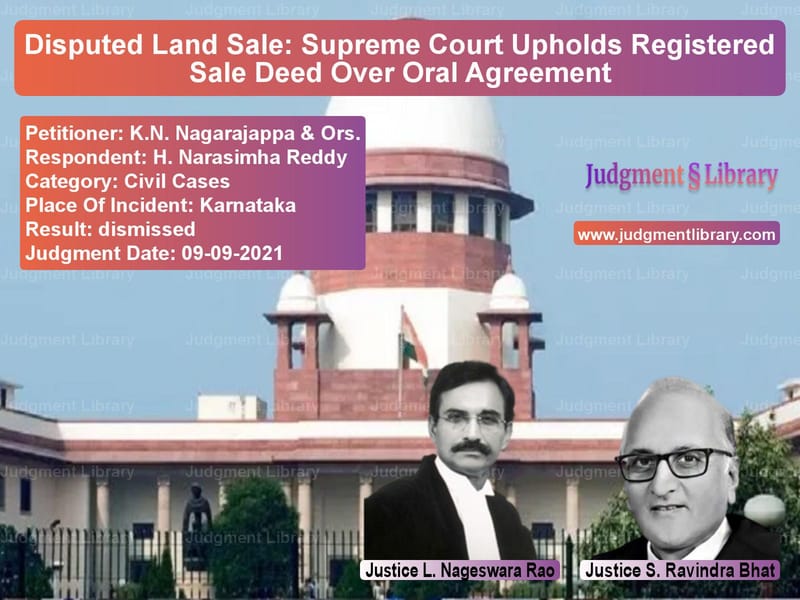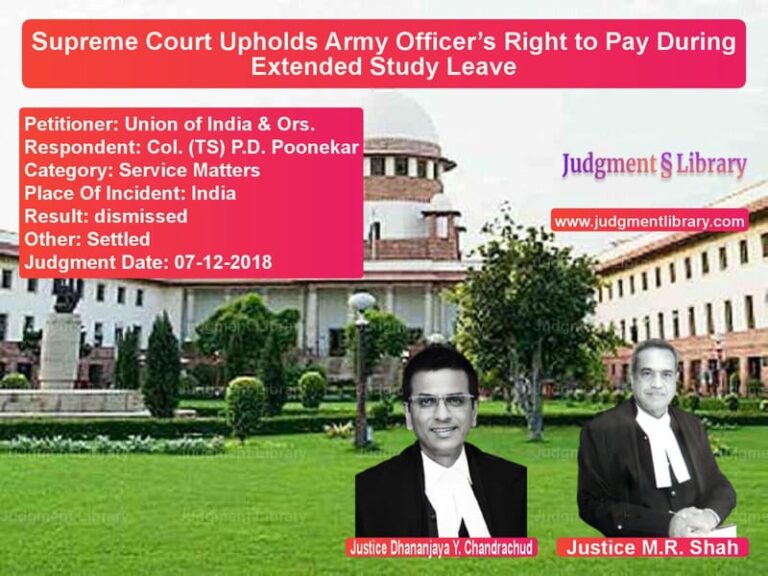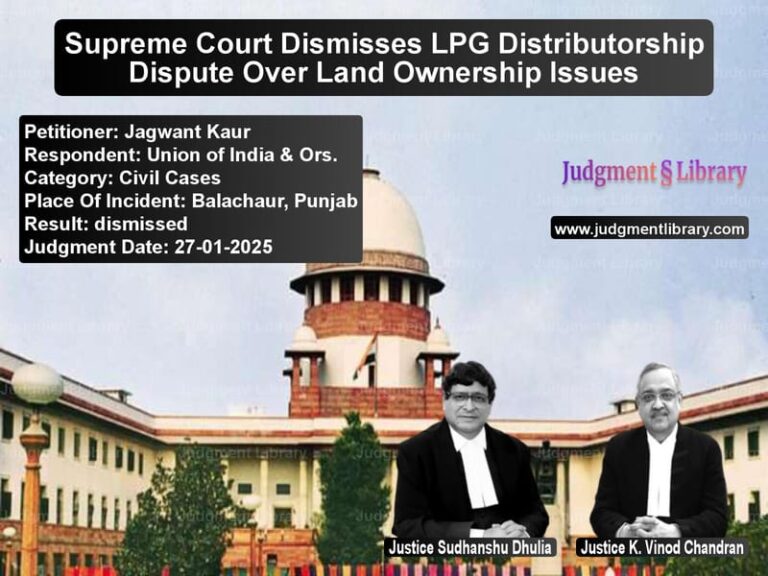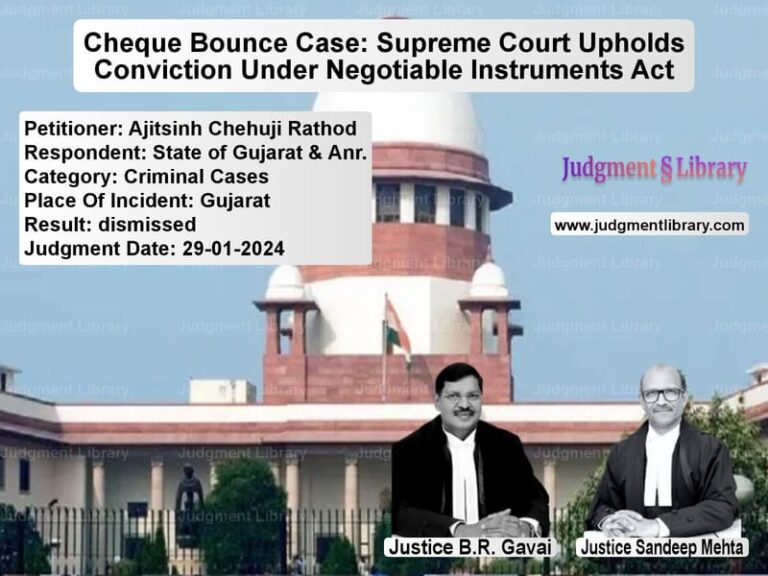Disputed Land Sale: Supreme Court Upholds Registered Sale Deed Over Oral Agreement
The case of K.N. Nagarajappa & Ors. v. H. Narasimha Reddy revolved around a disputed land transaction where the appellants claimed that a registered sale deed was only a security for a loan, while the respondent asserted it was an absolute sale. The Supreme Court examined whether an oral agreement for repurchase could override a legally executed and registered sale deed.
Background of the Case
The dispute originated in Karnataka, where the appellants (original landowners) sold three parcels of land—Survey No. 36/1 (28 guntas), Survey No. 37 (1 acre 30 guntas), and Survey No. 28/2 (13 guntas)—through a registered sale deed dated May 28, 1973. The respondent (purchaser) later filed a suit (OS No. 20/1985) seeking declaration of title, possession, and mesne profits, arguing that he was unlawfully dispossessed by the appellants.
The appellants countered by filing another suit (OS No. 22/1985), claiming that the sale deed was merely nominal and executed as security for a loan of ₹9,000. They produced an alleged oral agreement (Ex-D3), arguing that the purchaser had agreed to reconvey the property upon repayment of the loan.
Key Legal Issues
- Whether the registered sale deed constituted an absolute transfer of ownership.
- Whether the oral agreement for reconveyance (Ex-D3) was valid and enforceable.
- Whether the Karnataka High Court was justified in reversing the appellate court’s ruling.
Arguments by the Appellants (Original Landowners)
The appellants contended that:
- The sale deed was not intended to transfer ownership but was merely a security for a loan.
- The agreement to repurchase (Ex-D3) was proof that the transaction was a mortgage rather than an outright sale.
- The first appellate court correctly ruled in their favor, recognizing their right to reclaim the land.
Arguments by the Respondent (Purchaser)
The respondent countered that:
- The sale deed was a legally registered document, and its validity could not be negated by an alleged oral agreement.
- The appellants’ claim lacked documentary proof, and they failed to provide receipts or evidence of loan repayment.
- The trial court and the Karnataka High Court correctly held that Ex-D3 was unreliable and could not override the sale deed.
Supreme Court’s Analysis
The Supreme Court, comprising Justices L. Nageswara Rao and S. Ravindra Bhat, analyzed whether the alleged oral agreement (Ex-D3) could override a registered sale deed.
Key Findings
- Registered Sale Deed Holds Primacy: The Court emphasized that a legally registered sale deed cannot be invalidated by an oral agreement unless backed by substantial evidence.
- Oral Agreement Was Not Credible: The Court noted inconsistencies in Ex-D3, including missing details about land specifics and repayment terms.
- Burden of Proof on the Appellants: The appellants failed to provide receipts proving repayment of the alleged loan.
- Land Tribunal Proceedings: The appellants had previously claimed tenancy rights under the Karnataka Land Reforms Act, contradicting their argument that the sale was nominal.
Key Observations by the Supreme Court
“A sale deed executed and registered in accordance with law carries a strong presumption of correctness. Mere oral assertions cannot override documentary evidence.”
“The courts must be cautious in entertaining claims that seek to rewrite concluded transactions, particularly when no substantial proof of contrary intention is produced.”
Final Judgment
The Supreme Court ruled:
- The Karnataka High Court’s decision was upheld, affirming the respondent’s ownership rights.
- The appellants’ suit (OS No. 22/1985) was dismissed, rejecting the claim for reconveyance.
- The appellants were directed to vacate the disputed land and return possession to the respondent.
Implications of the Judgment
This ruling has important legal implications:
- Registered Sale Deeds Prevail: Courts will not entertain oral agreements contradicting legally executed documents.
- Strict Standard of Proof: Parties claiming a sale was nominal must provide substantial documentary evidence.
- Precedent in Land Disputes: The ruling reinforces the finality of registered transactions in property disputes.
Conclusion
The Supreme Court’s decision in K.N. Nagarajappa v. H. Narasimha Reddy upholds the sanctity of registered sale deeds and clarifies that oral agreements, without substantial proof, cannot alter ownership rights. The judgment sets a precedent for property disputes where parties attempt to nullify legally executed transactions through verbal claims.
Petitioner Name: K.N. Nagarajappa & Ors..Respondent Name: H. Narasimha Reddy.Judgment By: Justice L. Nageswara Rao, Justice S. Ravindra Bhat.Place Of Incident: Karnataka.Judgment Date: 09-09-2021.
Don’t miss out on the full details! Download the complete judgment in PDF format below and gain valuable insights instantly!
Download Judgment: k.n.-nagarajappa-&-o-vs-h.-narasimha-reddy-supreme-court-of-india-judgment-dated-09-09-2021.pdf
Directly Download Judgment: Directly download this Judgment
See all petitions in Property Disputes
See all petitions in Specific Performance
See all petitions in Landlord-Tenant Disputes
See all petitions in Judgment by L. Nageswara Rao
See all petitions in Judgment by S Ravindra Bhat
See all petitions in dismissed
See all petitions in supreme court of India judgments September 2021
See all petitions in 2021 judgments
See all posts in Civil Cases Category
See all allowed petitions in Civil Cases Category
See all Dismissed petitions in Civil Cases Category
See all partially allowed petitions in Civil Cases Category







